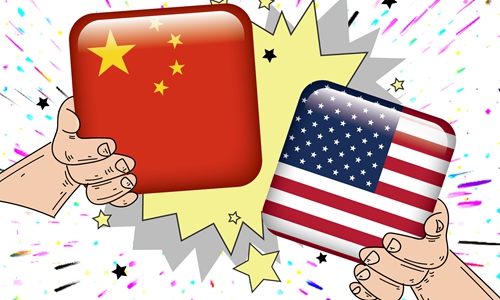Beef up technology and engage US with new mechanisms, exchanges
By Fang Xingdong Source:Global Times Published: 2020/6/9 19:03:40

Photo: GT
Although the COVID-19 pandemic has changed the world, it fails to alter US attempts to advance a technological war. The purpose of the US launching a technological war is to compete for dominance in science and technology and contain China with various means. The so-called decoupling is one of the US' China containment tactics. The US will target any country, even if it may be an ally, in order to maintain its own technological hegemony.
The US is supposed to win technological dominance through fair competition and by accelerating its own pace of innovation. Even if China's technological strength is rising, China and the US can still build a community of shared interests by drawing on each other's strengths.
However, Washington has turned a blind eye to morality, suppressed Chinese enterprises by dirty political means, and tried to maintain its hegemony by selectively decoupling in certain sectors and transferring part of its industrial chains out of China.
Washington aims to minimize its losses and maximize its benefits.
The extent to which the US would fight a technological war with China depends on whether the measures it has taken will lead to a de-sinicization of the world supply chain. Or will these efforts become counterproductive, speeding up the de-Americanization process?
If the consequence is the latter, the US will have to give up its technological war and reconsider cooperation with China for possible win-win results.
That being the case, a partial China-US decoupling in the technological sector within a certain period is inevitable. But the final result of this technological war depends on several factors.
First, values are the key point of this contest. To contain China, the US under President Donald Trump has abandoned its long-standing values - openness, globalization, fair competition and innovation. The US has been sabotaging these values, yet China should further maintain them in order to promote high-tech progress.
Second, the ultimate interest is fundamental. Despite the US' frequent tactics, interest has always been the basis of its decisions. China should also weigh the benefits, be aware of the US' calculation, and invalidate the US' strategy toward China.
Last but not least, promoting development is a fundamental principle. Strengthening ourselves is the best strategy. At present, the US mainly uses its obvious advantages in core technology and industrial chains to contain China. However, what matters is whether or not a de-Americanization process will occur in industries that have been monopolized by the US for more than half a century.
China should never be restrained by US moves and it should introduce new opening-up strategies to attract more overseas talents and experts to Chinese enterprises and universities. We should increase investment in education and basic research, provide more investment in global scientific and technological fields, and create more original core technologies and more public goods. These will be gains for China's global reputation. We must get rid of the mercantilist mind-sets that focus on short-term interests and we should think big about our future goals, missions and values.
Despite all the ups and downs, the numbers of global internet users and other indicators which can boost globalization are still surging. The irresistible power of markets, technology and human interconnection is the foundation of our confidence. In the end, we may still need to promote new China-US cooperation mechanisms in the fields of science and technology and work together for human development.
The author is director of the Center for Internet and Society at Zhejiang University of Media and Communications and founder of Beijing-based technology think tank ChinaLabs. opinion@globaltimes.com.cn
Posted in: VIEWPOINT,FEATURE